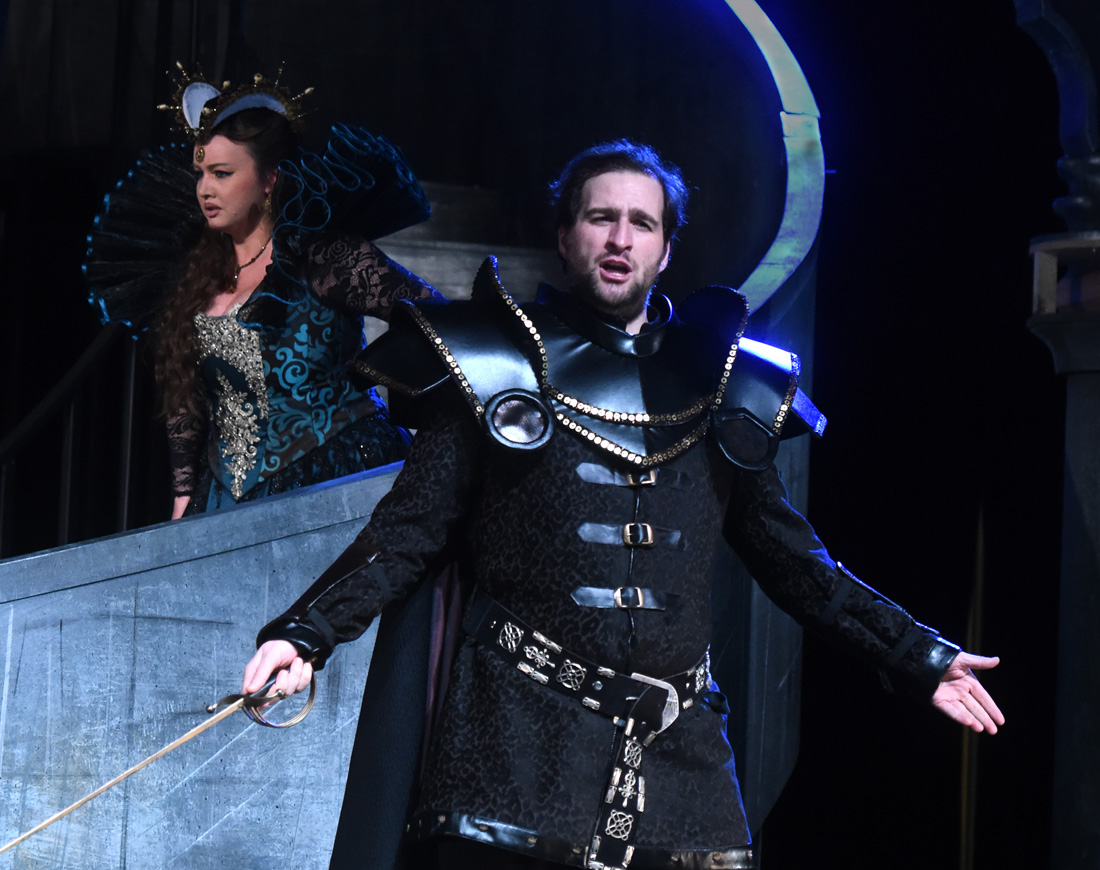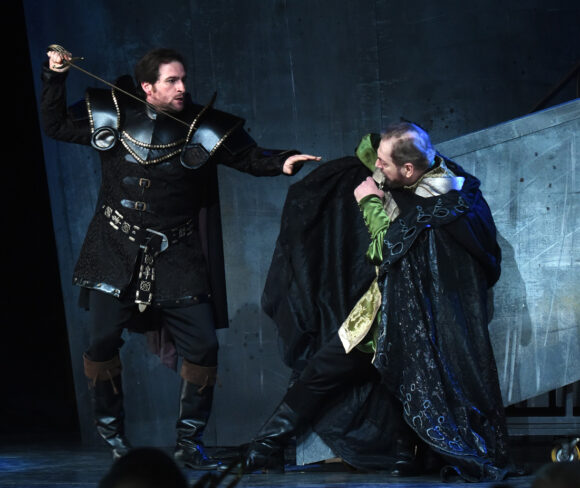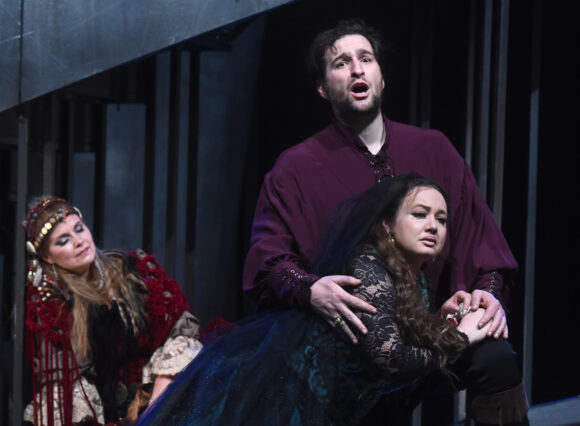The Csokonai Theater in Debrecen is preparing for the performance of The Troubadour with world-class opera singers. Verdi’s opera was last performed in Debrecen almost thirty years ago, in 1995. Before the premiere due on the 18th February, we interviewed Riccardo Massi who will play Manrico.
The interview reveals what brought the Italian tenor, who sings on the world’s most prestigious opera stages, to Debrecen, how he thinks about the role of opera today, why he is fond of Verdi, and how he reveals the moments of the opera’s magical power.
Scanning through the venues of the performances you took a role in during the last decade (from Toronto to Sydney, including New York, Munich…) the question arises: what brought you to Debrecen? With your busy schedule, what is your guideline when accepting a request for a performance?
The first thing was that I took a look at the venue – honestly, earlier I did not even know that Debrecen exists, I am not a master in geography – but the point is that I knew the name of Maestro János Ács, so I accepted gladly to work with him. And also, I love the role, Verdi is my favorite composer!
Have you ever worked with Maestro János Ács before?
No, I only knew his name, I knew that he worked with Pavarotti and other great singers, he is a name in the world of opera. The period was free in my calendar, so I said to myself, why not? Let’s go!
Are the person and the personality of the conductor so important for you, when you interpret a role?
Definitely, yes! What we do when we are on stage, is much more than just singing and acting. Our job is very difficult because we have to create a kind of – some people call it alchemy – I call it chemistry, but if you manage to create an empathic contact with the conductor and he transfers it to the orchestra, then the music becomes more than music, it becomes magic! And that does not happen very often! Sometimes you work with a conductor who cares only about the orchestra, the tempo, the music, and the more they are focused on the orchestra the less they focus on what happens on the stage. But when you have a conductor like him, with his experience and inspiration, you have the base to create what I call magic. He knows what he wants but you can also see how much he loves this role you are singing. While he is conducting he is looking at you, breathing with you, singing with you. And as I already said: that doesn’t happen very often.
Is the director also an important part of the interpretation?
You might think that in a traditional setting the director’s job is easy because Verdi wrote down everything, also the interactions between the characters, so basically you already know what to do on the stage. But, we know he was a genius and sometimes he adds just little shades, shades of interactions between characters that are not written down but the music tells you what to do. And this is where a good director can come into the picture. Of course, he or she gives you the complete vision of the piece, mainly when we are talking about modern settings. A good director can give you new hints especially when you have done the role many times before. He can give you input, a new idea that you can put in the character and bring with you even in the next production. Ther is a very nice interview with Al Pacino that he did a few years ago. He used to say that it is the repetition from where creativity comes. As singers, we are linked to music and text. We are prisoners, in a good sense, of course, but we can not go outside these boundaries. But if you can add new colors, new emotions to the same thing you sang a hundred times, you have another inspiration that might touch the audience.
It seems that both you and János Ács are happy that Péter Gemza is about to make a traditional setting of this opera. Do you always prefer a traditional setting?
If I am honest I always prefer the traditional ones. Just because they work. On the other hand, I realize that the world is changing, we can not remain always with the traditional set, we have to change a little bit, we have to make it a little bit fresher sometimes, or mix traditional and modern. Even modern is fine for me, however, if there is a modern setting like for example a Rigoletto in a space station or on the Planet of Apes, in a science fiction movie, it is fine for me, but the idea has to be really good to make people believe that music can merge with that setting. And it does not always happen. Though I saw beautiful modern settings, for example, there was a very famous director, he passed away not so long ago, Graham Vick, he made Aida with a set of ancient Japan among Shoguns and samurais. You would think that this does not fit but you can not take your eyes off the stage! So, if the idea is good and it matches the original spirit of the opera then it can be done. Otherwise, you have the effect that I experienced sometimes and it is very disappointing, that you take place in a modern, extremely strange setting and the worst thing you can see from the stage is that the people in the first row of the audience look at their watch. At that very moment you know that the staging has failed, you’ve lost immediately the attention of the audience. The singers can do their best in the role, the conductor can be fantastic, but the audience won’t be involved. Traditional settings have been working for centuries and there is a reason for that. Classic is timeless.
Maybe modern settings are for catching the attention of another generation.
Classic settings can do that, too! A few times I brought my teenage nephews to see a traditional setting and they were blown away! We should not think about young people in terms of fashion all the time. When you have under your hands something so beautiful like opera, a timeless beauty, it can catch the heart of a nine-year-old or a five-year-old kid the same way. I saw something very smart that they do in the United States and in Australia. They bring entire classes of kids from middle school or high school to see the final dress rehearsal free of charge. Of course, some of them just play with their phones but you can see some of them with the look on their face that shows that they are delighted. Those guys will be part of the next generation of audience. Why don’t we do this all over the planet?
Where does your dedication to opera come from, were you an opera fan already as a kid?
It comes from passion. And when you have a strong passion for something, dedication follows immediately. If you want something, you put all your energies to reach that goal. When I was a kid my father, when we were traveling by car, was always listening to the tapes of Franco Corelli, Luciano Pavarotti, Domingo, because he had a great passion for opera. He was not capable of singing, I am the first musician in the family, the black sheep. I grew up listening to it. One day when I was about 13 years old, I started to imitate a song that I heard from Pavarotti. My father was driving and got very surprised by it: what the hell was that?! Then he brought me to a very famous pianist, his name was Lorenzo Bavai, he was the official pianist for José Carreras for many years. He said this kid is a tenor, he can sing, but we have to wait until I grow up. Women are lucky because they can always sing with no consequences. But if we sing through puberty we can harm the instrument inside. So I had to „shut up” and not sign up until I was 19-20 years old. Then I finished high school, I moved to Rome and I found my teacher, David Holst, who is still my teacher – and here we are!
How did you find him?
By chance! I found him through my brother. A very good friend of my teacher lives in Milano and is a lawyer. This lawyer is a very good friend of my brother. One day they were playing golf, and my brother said to him that he had a young brother who would like to sing. This guy told him: I have a friend in Rome, he teaches singers! So they introduced me to him in February 1998, 24 years from now.
Can he still teach you anything?
You never finish learning! All the singers with a professional career have a teacher, all of us. You learn a technique with a master, that takes 5-8 years, like a university, but then in the years the body changes because we grow, we grow older. If the body changes, the voice changes a little bit, too. So you always need someone, who follows you, can hear you from the audience, and can tell you what was okay, what was not okay, where to be careful. So in the first year of your career, you need a teacher to guide you and to give your voice the right path to follow. Later you need an honest friend, an honest master who criticizes you.
Once you said that you liked Verdi because his music is healthy for the voice. What does it mean?
It means that Verdi, like all the opera composers from the style bel canto, with the cantabile inside the music, puts your voice on the right path. One month ago I had covid. Nothing serious but I had to stay at home for 10-11 days. No singing, of course. And when I had to start over, I sang Verdi! It educates your voice. Other composers like Puccini for example, Bellini or Donizetti is quite another thing! Puccini is beautiful and I love him, I sang many Tosca, Turandot, Manon Lescaut but Puccini is extremely tricky. He does not teach you how to sing. You sing Puccini once your voice and your technique are very stable. When your voice is radicated inside your body then you face Puccini. If I feel a little sick or I have a cold that is still not gone and I go on stage and I sing Verdi, a part of me knows that those phrases will help me to open up my throat, my body. The same does not happen with Puccini. In order to sing Puccini, you have to be very fit and to be in full shape. Otherways it is risky!
When interpreting a role, do you put the same energy into the acting part and singing part?
It goes all together! If you warm your voice up properly, you go up the stage and you think strongly about acting, it gives you a plus for singing. For me the more I think of the character the more it gives me the energy to sing.
Is it easy for you psychologically to interpret the heroic characters of opera-like Radames, Don José, Manrico?
For me, it is easy because before I was a singer I was a fighter. I feel that these characters fit me, I have a strong feeling about them. I easily slip into them.
Do you have a favorite character?
Talking about Verdi, I like very much Manrico, Radames, Riccardo, – those are beautiful roles. I can not choose only one. It is like asking a kid what does he prefer, chocolate or ice cream. I don’t know for others but as for me, with the music, these characters are like magnets, I am dragged to be part of them, to live them. There are some nights when I am on stage and a miracle happens to me: I feel that I am not only acting but I am that character. In these cases, I have to be careful because I feel the tears coming and if I cry a little bit, it shrinks the throat and I can’t sing! So I had to learn to be able somehow to manage the emotions slide through me and pass to the audience without affecting too much my singing. These moments are one of the mysteries of opera. Call it whatever you want to but you can not preview this magic and you can not explain it later either.
Borbála Kulin




















